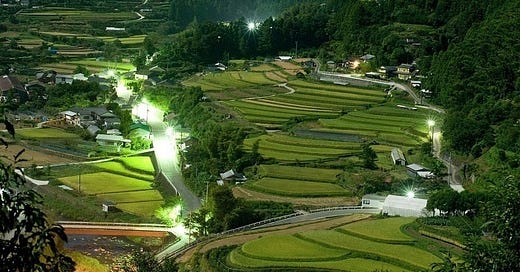Every village in Japan has a ku-cho—a neighborhood leader. I think it’s a passed-around position.
Soon after we moved into this valley, we needed to ask some questions about the garbage collection system. We also needed to pay an annual resident’s admin fee that covers things like tidying up roads and drains, festivals, decorations, and fire safety patrols. (Most importantly, the admin fee is a bit of a party pot, covering the beer/sake that volunteers get when they work on town tasks.)
“You need to speak to Saitoh ku-cho about garbage. We’ll ask him to drop by,” someone said. And within a few days at precisely 9AM there was a ring at the front door.
Saitoh introduced himself. He is a modest man in his late 50s that, judging from the blurb on his truck’s side door, is in home construction of some sort. Cutely, he seems a bit on the timid side. His voice quavers when he asks a question or seeks a clarification.
Turns out we selected a loose valley on the garbage question—everything is spotless here but the townfolk don’t go in for multilayered rules and expected behaviors. “Just put burnable and non-burnable trash in separate bags, and feel free to bring those bags to the collection points on whatever day you like. This is what everyone does!” Saitoh reassured us.
Toru and I couldn’t believe our good fortune. Parts of Tokyo are seemingly run according to Shariah Law when it comes to garbage infractions.
A couple of weeks after that trash briefing, Saitoh ku-cho stopped by when I was gardening out front. He was mumbling a bit so I thought he was trying to break the bad news that we had broken a rule.
JK: “Is everything alright? Did we do something wrong?”
Saitoh: “No, no, there’s nothing wrong. Do you know about the water up on the hill? There’s a lake up there and we are having a neighborhood meeting on Friday evening to talk about what would happen if the walls busted someday.”
JK: “Oh my god. Serious? Will it break?!”
S: “No, no. This is more of a meeting to manage expectations. We need to report on the situation and let everyone know steps that are being taken.”
JK: “Oh okay. We will do our best to attend.”
In the end, we couldn’t be there but soon all the written materials were put into our mailbox. Saitoh was right—this was a technical meeting laying out highly unlikely, nightmare scenarios in which every single bit of planning goes wrong and everything is destroyed. Basically, risk management so no one could complain when hell actually did freeze over. Very Japan!
A few weeks ago, I was again out front gardening. Saitoh pulled up in his tiny truck, rolled down his window, and said, “Regular monthly neighbor’s meeting tonight at 7PM. You don’t have to attend, but you’re welcome should you want to drop by!”
Toru and I agreed it would be smart to show up.
Each nook of this valley has its own small house set aside for these meetings. The kanji on the signboards outside basically translate to [Valley area name]’s people get-together place.
Toru and I arrived at our neighborhood’s spot right at start time, and the room was already full. Everyone sat cross-legged on a large tatami floor, while Saitoh ku-cho and an aide(?) sat up front facing the residents. The average age in the room looked to be 70.
I recognized our over-the-hedge neighbor Mr. Hata, and a few of the other faces were familiar from my regular dog walks through the valley.
Saitoh started by stating the date for the minutes. He then opened the meeting with a rundown of wildlife trapped/shot in the area the past 30 days. “Boar 112, deer 73, monkeys…”
MONKEYS? Toru and I shot a look at each other. The presence of often-violent primates was a surprise, but I was equally taken aback by the sheer numbers of other (delicious-sounding) meats roaming these hills.
I whispered to Toru, “What do they do with all that meat?” He shushed me but gave me a reassuring look of, “No idea, but believe you me I am going to find out.”
Author’s sidenote: Toru’s boar stew, paired with one of my Rhone Valley Grenache Syrahs, is life-altering…
Saitoh briefly touched on the water issue up the hill. He also mentioned that our valley is working on bringing back its annual matsuri festival after several years of pandemic halt.
There was a quick Q&A and other residents were allowed to bring up any issues they’d like the group to ponder. As we broke up, I moved to the head of the room to speak to our valley leader.
JK: “Saitoh-ku cho, you mentioned a matsuri. When is that?”
S: “We don’t know yet, but usually we hold that on a weekend near July 20-something. We will finalize soon.”
JK: “Just by the way. I love matsuri from way back, and really like to get involved. If you find there are volunteer tasks, please let me know.”
S: “Will do. Thanks!”
Perfect. When buying this land, I often thought that I need to as quickly as possible volunteer with the locals. A summer matsuri is an ideal chance to broaden circles and, well, prove you’re not a tourist.
Before leaving the meeting I quickly glanced the walls of the meeting hall. I badly need to go back because there are faded photos, awards, and mementos from our valley’s past everywhere. Maybe I can schedule some tutoring time with the ku-cho—he’d know the stories behind much of it.







Fantastic! All so alive now :-)
At first we thought similar about ur jijikai…….but, after the endless drunk social events in which all the grandpas reminisce about their sex lives, it was easy to see why no women or anyone under 60 turned up.